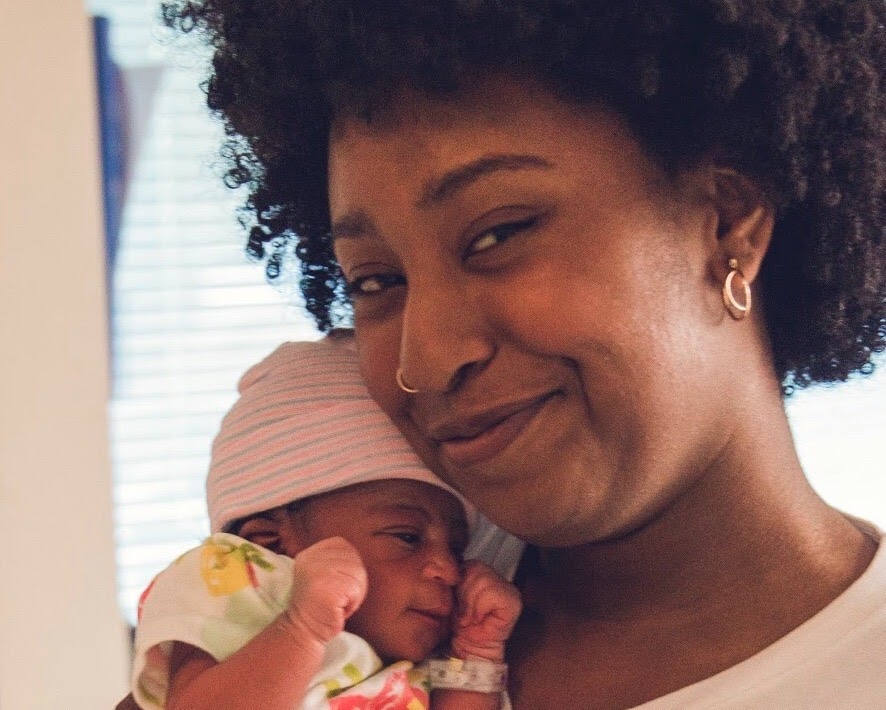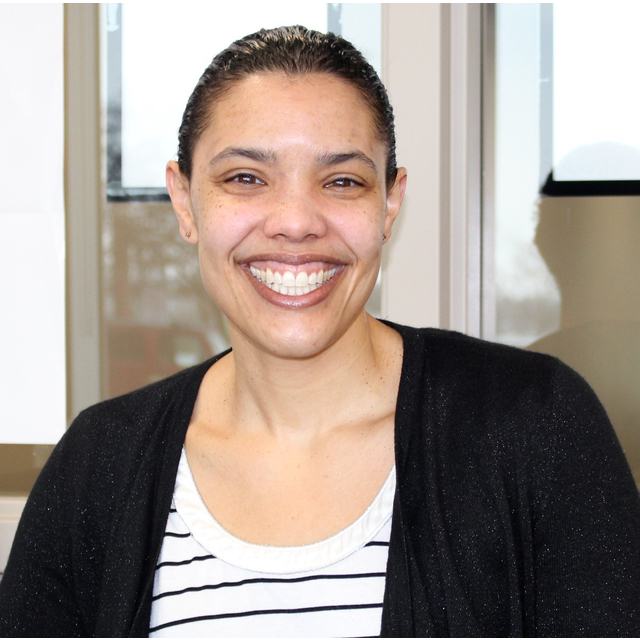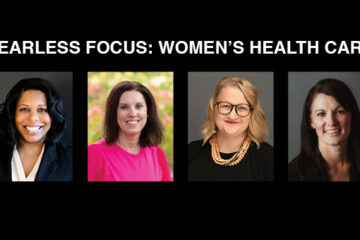By Emily Blobaum, Fearless contributing editor

Black birthing people in Iowa are six times as likely to die from childbirth than their white counterparts.
Olivia Samples has heard that statistic plenty of times. Quite frankly, they’re tired of hearing it.
“Having folks die in childbirth should not be an outcome that anyone is OK with,” they said.
Samples, who is based in Des Moines, is a nonbinary holistic doula and provides emotional, educational and physical support to families throughout the process of becoming a parent. They specialize in serving Black and queer folks and primarily work in the areas of prenatal planning, labor support, postpartum care and lactation counseling, all while taking social determinants of health into consideration.
Samples and others interviewed for this story use more inclusive phrases “birthing parent” and “birthing people” because not all people who give birth identify as women.
Unlike doctors and midwives, doulas are nonmedical professionals. Doulas don’t deliver babies, but rather serve as a resource and extra set of hands for the birthing parent. A doula might help create a birth plan, give massages, run errands and walk through relaxation and labor techniques.
As maternal mortality rates continue to increase in the U.S., studies have linked doulas with improved birth outcomes. In one 2013 study, doula-assisted mothers were only one-fourth as likely to have a baby with a low birth weight and half as likely to experience a birth complication.
The study said modern maternity care practices in hospitals reduce the availability of an attending nurse to remain with the birthing parent throughout the entirety of the labor process, which leads to the loss of continuous support. Doulas step in to provide that support and by doing so, increase the birthing parent’s ability to affect their own pregnancy outcomes.
In our current health care environment where Black birthing parents face higher risks throughout their pregnancies and aren’t well represented in professional health care fields, having a doula who can identify and relate with your background is becoming increasingly important.
When they completed their certification just over two years ago, Samples was the first Black doula in Central Iowa. Now there are at least six Black doulas in the state.
“In terms of maternal mortality especially, there’s a lot of evidence that working with folks who look like you leads to better health outcomes. That’s why it’s so amazing and beautiful to see more Black doulas entering the workforce,” Samples said.
As part of their practice, Samples attends many conferences, workshops and events centered around maternal health, some of which tend to focus on the rates at which Black birthing people are dying.
“That’s valid and should be shared, but Black maternal health in itself does not mean disparity. Maternal health should be joyful and exciting.”
“…Black maternal health in itself does not mean disparity.”
One particular conference last year left Samples in a puddle of angry tears after they saw a series of slides that detailed the rates at which Black birthing people smoke, don’t receive prenatal care in the first trimester, live in poverty, are covered by Medicaid and die while giving birth.
“As I’m sitting here looking at this slide, I’m thinking, that’s me. That’s my sister. That’s my mom. It made me want to vomit. I think people who continuously share these statistics don’t often think about the fact that the people who are receiving them have reactions to it,” Samples said. “You can’t just share that this many people are dying in childbirth and then move on.”
After the conference, Samples napped and journaled.
“… I wish we could have a Black maternal health conference that centered around not only Black birthing people, but the joy in Black parenthood, in birthing Black children and in Black communities. There are so many people and projects making a huge impact on these disparities in our own community. Why do we most often uplift the violence? What you pay attention to grows,” Samples wrote in a blog post.
Samples decided that they would make their own conference to help change the conversation and talk about what’s working well instead of what’s going wrong.
“In Iowa, we have a lot of work to do, but there’s also a lot of great work that’s been happening,” they said.
Five months later, the Celebration of Black Kin Conference was born.
The conference, which is based here in Iowa but will be held virtually April 11-17, is open for anyone who is invested in the overall health of the community, because maternal health issues don’t just affect pregnant people, Samples said.
“I believe that the people most affected by an issue are the people who should be active participants and leaders in cultivating solutions,” Samples said. “It’s easy to forget that there are people behind the statistics. I really want to uplift those voices.”

Disparities have existed in maternal mortality for many years. Nationally, Black birthing people are three to four times more likely to die from childbirth.
At the state level, the Iowa Maternal Mortality Review Committee reviews all pregnancy-associated deaths and any deaths of women within one year following the end of a pregnancy, regardless of the cause. The latest report, published in March of 2020, analyzed 39 deaths that occurred in a 2½-year period.
Eleven cases were pregnancy-related and more than half of the deaths reviewed were considered to be possibly preventable.
Iowa’s overall pregnancy-related maternal mortality rate is 9.4 per 100,000 live births, below the national average of 17.4 material deaths per 100,000 live births, but still not great. Breaking it down by race and ethnicity, the maternal mortality rate for Black birthing parents is 36.9 per 100,000 live births, 6 for white birthing parents, 9.7 for Hispanic birthing parents and 23.5 for Asian/Pacific Islander birthing parents.
The maternal mortality rate of 9.4 per 100,000 live births is “a small number, but a disparity exists,” Nalo Johnson said. “We need to have a better understanding of what’s occurring within the status of Black maternal health in the state.”
Johnson is the division director for health promotion and chronic disease prevention at the Iowa Department of Public Health. Her office oversees the maternal mortality review committee.

When analyzing the data, Johnson stresses the need to look at the broad picture of health by examining outcomes and behaviors and determining if disparities are due to access, poverty or health insurance issues.
One key indicator that Johnson is interested in is the rate at which birthing people are receiving prenatal care in the first trimester. In 2019, 86% of white birthing people received prenatal care in the first trimester of their pregnancy, compared with 70% of Black birthing people.
Another indicator is the rate of breastfeeding at the time of hospital discharge. In 2019, 84% of white birthing people were breastfeeding as they left the hospital, compared with 69% of Black birthing people.
Black birthing people also have higher rates of severe maternal morbidity, Johnson said.
In addition to the existence of medical racism, public health experts believe there are a variety of factors at play as to why disparities exist. Looking at social determinants of health, like access to affordable housing, quality education, adequate nutrition and health insurance, is gaining in popularity among health care providers.
“There are a lot of things on a systems level that we need to address,” Lastascia Coleman said.
Coleman is a certified nurse midwife and clinical assistant professor in the department of obstetrics and gynecology at the University of Iowa, co-founder of the Black Women’s Maternal Health Collective and is the only Black midwife in the state.
“If you’re telling people to walk every day for their fitness but you don’t ask them if they have a safe place to walk, that’s a structural problem,” Coleman said. “We give all of these lifestyle recommendations, but we have to follow up and make sure they’re attainable.”
Addressing the Black maternal mortality crisis requires innovation at all levels of health care and leadership.
“There isn’t one answer to reduce Black maternal mortality,” Johnson said.
“There isn’t one answer to reduce Black maternal mortality.”
Other solutions identified by Coleman, Johnson and Samples are as follows:
- Raise awareness and welcome new perspectives. “Acknowledging that there is a disparity is a good first step,” Johnson said. “These disparities have existed for many years, but the difference is now we’re having conversations about them.” Johnson started working in her role at the state public health department, which includes overseeing the issue of maternal mortality, in 2019. “I don’t think it should be lost that we have a woman of color leading our maternal health efforts in the state for the first time.”
- Better representation within the field. Having someone who looks like you can help drive down maternal mortality rates, Coleman said. “There’s data showing that babies born with a racially congruent provider have better outcomes than babies born with a non-racially congruent provider.”
- Address implicit bias and medical racism. “We have a lot of deep-seated things within our health care system that we need to address,” Coleman said. “We need to be more thoughtful about how we interact with patients in general and we need to have a full-stop moment to reflect on how we do things and whether they’re the right thing.”
- Support innovative practices like certified nurse midwife and doula services. Hiring a doula or a midwife isn’t cheap. Doula services can range from $500 to $3,500 or more. “The people who need doulas the most don’t have access to them right now,” Coleman said. The Iowa Department of Public Health is currently in the planning stages of a pilot program that would provide culturally congruent, community-based doula services at three targeted Title V maternal health clinics in areas of the state with the highest proportion of Black populations. The program, called the Iowa Title V Community-Based Doula Project for African American Women, would offer services from a doula — should the client want them — by using funds from the program, Johnson explained. “We would love to be able to use this project to make a case for reimbursement of doula services by insurance providers.”
- Expand Medicaid coverage. To put it simply, we need better coverage, Coleman said. “Sixty days after giving birth, your coverage is gone.” This is particularly relevant because 56% of the maternal deaths that the Iowa Maternal Mortality Review Committee examined occurred postpartum.
- Examine social and structural determinants of health. “Thinking about someone holistically as a whole person is a major way that we can change a lot of the health outcomes that we’re seeing right now,” Samples said.
- Pass legislation that targets the issue. Johnson points to the Momnibus Act that the Congressional Black Maternal Health Caucus introduced last year. The Momnibus is composed of nine individual bills that address issues related to funding, improving data collection, diversifying the perinatal workforce and investing in maternal health care.
The bottom line is that people are unaware of what’s going on, Coleman said. “This needs to become a priority. We have to do something. We can’t sit around.”
Editor’s note: This story primarily focuses on maternal mortality and how it affects Black people. It’s clear that Black birthing people experience the highest maternal mortality rates, but it’s also apparent that there is a general racial disparity at play. I plan to produce more pieces in the future on how people of other races and ethnicities are affected. If you or someone you know has experienced disparities in maternal care, please reach out to me at emilyblobaum@bpcdm.com.



1 Comment
Rhoda Berkow · February 12, 2021 at 12:02 am
WOW! What a disturbing eye opener! Thank the Doulas not only for doing what they are doing, but telling the Public what’s going on to black women! What a shame! Most folks had no idea! These women are angels, and to make it knowledge to the public, will make a great difference!
Comments are closed.